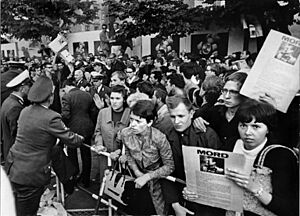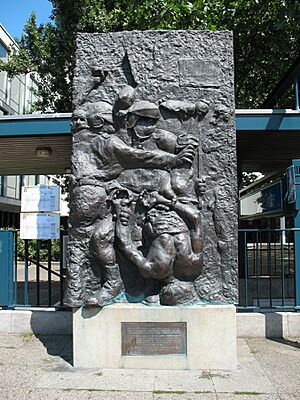Killing of Benno Ohnesorg facts for kids
Quick facts for kids
Benno Ohnesorg
|
|
|---|---|
| Born | 15 October 1940 Hanover, Germany
|
| Died | 2 June 1967 (aged 26) Charlottenburg, West Berlin, West Germany
|
| Cause of death | Gunshot wounds |
| Alma mater | Freie Universität Berlin |
| Occupation | Student |
Benno Ohnesorg (born October 15, 1940 – died June 2, 1967) was a university student in West Germany. He was killed by a police officer during a protest in West Berlin. His death became a very important event and helped the student movement grow much larger.
Contents
The Protest and Shooting
A Student's First Protest
On June 2, 1967, Benno Ohnesorg took part in a student protest. The protest was held near the Deutsche Oper opera house in Berlin. Students were protesting against the visit of the Shah of Iran, Mohammad Reza Pahlavi. The Shah was attending a performance of an opera called The Magic Flute that night. This was the very first political protest Ohnesorg had ever joined. During the protest, he was shot and killed by a police officer.
Later Investigations
New Information Comes Out
Many years later, in 2009, new facts about the shooting came to light. It was found that the police officer who shot Ohnesorg had secretly worked for the East German secret police, known as the Stasi. He was also a member of the ruling Communist party in East Germany. However, it is still not clear why the officer shot Ohnesorg. Documents found in the Stasi files did not show that the officer was ordered to shoot Ohnesorg by the Stasi.
Was It Self-Defense?
In 2012, a German magazine called Der Spiegel reported new findings. Research by prosecutors and the magazine suggested that the shooting was not done in self-defense, as the officer had always claimed. Instead, it seemed to have been planned. New film and photo evidence also showed that other police officers and their bosses may have covered up the truth. They might have hidden facts during the investigations and trials that followed. Even medical staff who examined Ohnesorg were reportedly told to change their report. However, these new findings were not enough to reopen the case officially.
Ohnesorg's Legacy
A Spark for Change
Benno Ohnesorg's death became a very important moment for people who supported left-wing ideas. It helped the German student movement grow much bigger and stronger. A group formed around 1971, called the Movement 2 June, was named after the day he died.
Student Leaders and Their Ideas
A student leader named Rudi Dutschke led many student protests after Ohnesorg's death. At a conference, Dutschke talked about taking strong action, even if it meant breaking some rules. This led to a disagreement with a professor, who thought Dutschke's ideas were too extreme.
The student movement grew a lot and became more active after Ohnesorg's death. This movement influenced many young Germans who later became politicians.
Memorials and Tributes
There is a monument near the Deutsche Oper Berlin that remembers Ohnesorg's killing. It was designed by an Austrian artist named Alfred Hrdlicka. In 2008, an official memorial sign was placed on the sidewalk where Ohnesorg was shot. In his hometown of Hanover, a bridge over the Ihme river is named after him.
In Film
The movie Der Baader Meinhof Komplex (from 2008) begins by showing Ohnesorg's death. The role of Ohnesorg was played by Martin Glade.
See also
 In Spanish: Benno Ohnesorg para niños
In Spanish: Benno Ohnesorg para niños
- West German student movement
 | Leon Lynch |
 | Milton P. Webster |
 | Ferdinand Smith |



